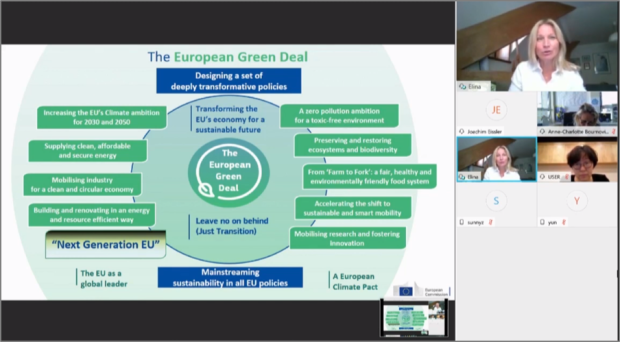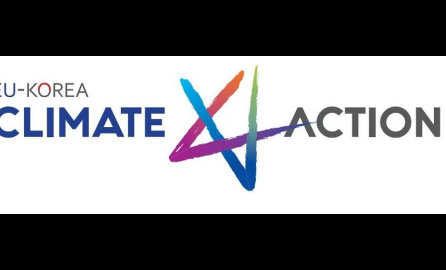Event 3: Webinar on the European Green Deal
The EU-Korea Climate Action Project Team in cooperation with the Energy Transition Forum held the webinar, ‘European Green Deal: An Opportunity for Green Economic Recovery after COVID-19' on 25 June 2020, to discuss the direction and details of the Korean Green New Deal policy in light of the European Green Deal. Elina Bardram, Head of International Relations at the Directorate-General for Climate Action of the European Commission, and Anne-Charlotte Bournoville, Head of International & Enlargement at the Directorate-General Energy of the European Commission, were invited to this webinar as EU speakers. Sun-jin Yun, Professor of the Graduate School of Environmental Studies at Seoul National University, Chang-hoon Lee, Senior Research Fellow at the Korea Institute for Environmental Policy and Evaluation, and Won-young Yang Yi, Parliamentary Member of the Democratic Party of Korea, participated as speakers from Korea. Jong-ho Hong, Co-chair of the Energy Transition Forum, moderated the discussions.
The webinar started with opening remarks delivered by the two representatives of the organizers, who emphasized the importance of developing and implementing the Green New Deal policy in Korea and the rising demands for multilateral cooperation, smart investment, and policymakers’ actions to fight against climate change.
After the opening speeches, Elina Bardram and Anne-Charlotte Bournoville introduced the details of the European Green Deal. Elina Bardram explained the background of the European Green Deal, the policy framework, the Climate Law, the European Union’s economic recovery and energy strategies based on the Green Deal, as well as the Just Transition mechanism. Anne-Charlotte Bournoville presented the investment plans and the direction of international cooperation for the European Green Deal, as well as potential areas for cooperation between the European Union and Korea.
The European Green Deal is a strategy for the European Union to move towards a resource-efficient and competitive economic system with the goal of realizing a climate-neutral society by 2050. The policy package provides comprehensive solutions for GHG reduction, resource circulation, and ecosystem restoration covering all sectors of the economy, which will be financed with the EU budget together with private investment. For implementing the policy, it is essential to define green activities, standards and certification of green financial instruments in order to bring private sector investments into the real green businesses. This is the background of the development of the international green taxonomy and international sustainable finance platform.
Following the presentation on the European Green Deal, Sun-jin Yun and Chang-hoon Lee introduced the background of the Korean Green New Deal policy, main issues, and the timeline for a comprehensive policy plan development and legislation. Sun-jin Yun pointed out the lack of clarity with the policy goals and direction and said providing comprehensive coal-phase out measures included in the policy is of particular importance, considering that 59 coal power plants are currently in operation with additional six new coal power plants to be added. She also identified other areas for improvement such as: a lack of clarity with the policy scope and direction of the Just Transition; a lack of participation and preparedness by local governments in the policy development process; and the needs for establishing necessary laws and systems. Following Yun’s speech, Won-young Yang Yi provided updates on the status of discussions at the Korean Parliament on Korea’s Green New Deal policy. Amongst various issues, the politicians are sharply divided particularly on whether the country should commit to the long-term carbon neutrality with a clear goal.
After the presentations, a Q&A session was held to allow for questions. In responding to the question on why the European Green Deal is called Green Deal not Green ‘New’ Deal, Elina Bardram said that having long pursued a green transition, the Green Deal is a package of existing policies to which the EU has given a new name as Green Deal. Another question was asked to Won-young Yang Yi, about the main obstacles encountered when implementing the Green New Deal in Korea. Won-young Yang Yi explained that main issues are a loss of jobs and markets to be resulted from the Green New Deal, uncertainties with creating new markets to make up the loss, and the industry’s distrust in and passive attitude towards the government’s green policy. She concluded that these problems must be solved through government leadership.

Related documents
The EU Green Deal and Economic Recovery after Covid-19 - DG CLIMA+ENER
English (1.87 MB - PDF)K-Green New Deal_The Current Status and Issues - Sunjin Yun
English (3.18 MB - PDF)Korean Green New Deal Issues - Changhoon Lee.pdf
English (201.03 KB - PDF)EU Green Deal Program
English (575.4 KB - PDF)